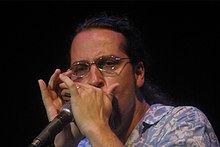Flávio Guimarães
Flávio Guimarães | |
|---|---|
 Flávio Guimarães | |
| Background information | |
| Birth name | Flávio Guimarães Borges |
| Born | November 10, 1963 |
| Origin | Rio de Janeiro, Rio de Janeiro, Brazil |
| Genres | blues |
| Occupation(s) | Singer, composer |
| Instrument(s) | Voice, harmonica |
| Years active | 1985–present |
| Labels | Veras, Eldorado, Natasha, Abril Music, Trama, Chico Blues Records, Delira Blues |
| Website | http://www.flavioguimaraes.com.br/ |
Flávio Guimarães (born November 10, 1963) is a Brazilian composer, harmonica player and singer. Considered a blues pioneer in Brazil, he founded the band Blues Etílicos in 1986, which is considered the most successful Brazilian blues group.[1] He has also played with many famous artists along his career, such as Alceu Valença, Ed Motta, Luiz Melodia, Paulo Moura, Zeca Baleiro, Buddy Guy, Charlie Musselwhite, Sugar Blue and Taj Mahal.[2][3]
Biography[edit]
Flávio Guimarães was born in Rio de Janeiro, Brazil. There he studied harmonica with Maurício Einhorn.[4]
He started his musical career around 1985. In 1986, he formed the group Blues Etílicos, with Greg Wilson (vocals and guitar), Otávio Rocha (guitar), Gil Eduardo (drums) and Cláudio Bedran (bass). With the group, Guimarães did many show around Brazil and the world, and recorded several albums.[2]
In 1988, Guimarães travelled to Chicago, where he played with many American musicians, including the harmonicist Sugar Blue. One year later, he opened Festival de Blues, in Ribeirão Preto, São Paulo, Brazil, playing with Buddy Guy. In that same year, he also opened shows for John Lee Hooker and John Mayall, during Free Jazz Festival. In the following years, Guimarães played in the most important festivals in Brazil, such as Blues Fest, Rock in Rio II, and Nescafé in Blues. During this period, he also played with many famous Brazilian artists, like Ed Motta, Roberto Frejat and Paulo Moura, as well as with international artists such as Midnight Blues Band.[2]
Since 1990, when Bizz magazine indicated Guimarães as one of the best harmonicists of Brazil, he has participated in many harmonica player meetings. In fact, Guimarães became famous among Brazilian harmonicists because he was the first one to play diatonic harmonicas in that country, introducing new possibilities of timbre to the music of his nation.[5] In 1998, he participated in Harmonica's Night, with Carey Bell and Peter Madcat. In this same period, with a new band, he opened for B. B. King, in Via Funchal, Brazil.[2] He, with Tavares da Gaita, was considered one of the most important attractions in the history of the Rec-Beat festival, in Recife, Brazil.[6]
Along his career, Guimarães recorded many albums. His first solo album was Little blues, in 1995. In 2000, he recorded his second album, named On the loose.[2] In 2007, celebrating 20 years of Blues Etílicos, his band recorded an album in honor of Muddy Waters, one of the biggest exponent blues musician.[7] Around two years later, Guimarães recorded another solo album, named The blues follows me, and he toured Brazil extensively, promoting this work.[3][8]
Discography[edit]
Solo albums[edit]
|
With Blues Etílicos[edit]
|
References[edit]
- ^ Neder, Alvaro. "Biography: Blues Etílicos". AllMusic. Retrieved April 17, 2010.
- ^ a b c d e "Flávio Guimarães: Dados artísticos". Dicionário Cravo Albin da Música Popular Brasileira (in Portuguese). Retrieved April 17, 2010.
- ^ a b "O blues agita o Peppers". Tribuna do Norte (in Portuguese). March 26, 2010. Retrieved April 18, 2010.
- ^ "Flávio Guimarães: Biografia". Dicionário Cravo Albin da Música Popular Brasileira (in Portuguese). Retrieved April 17, 2010.
- ^ Lins, Karyne. "Captação e gravação de gaita" (PDF). Revista Backstage (in Portuguese). pp. 48–54. Retrieved April 18, 2010.
- ^ "Rio promove festival com atrações pernambucanas". Brasil em Folhas (in Portuguese). October 24, 2005. Retrieved April 18, 2010.
- ^ a b "Blues Etílicos lança CD em homenagem a Muddy Waters". Brasil em Folhas (in Portuguese). July 30, 2007. Retrieved April 18, 2010.
- ^ a b "Gaitista Flávio Guimarães lança disco em Copacabana". R7 Notícias (in Portuguese). January 4, 2010. Retrieved April 18, 2010.
- ^ "Little Blues – Flávio Guimarães". Cliquemusic (in Portuguese). Archived from the original on December 19, 2009. Retrieved April 17, 2010.
- ^ "On the loose – Flávio Guimarães". Cliquemusic (in Portuguese). Archived from the original on June 15, 2011. Retrieved April 17, 2010.
- ^ "Blues Etílicos". Cliquemusic (in Portuguese). Archived from the original on June 15, 2011. Retrieved April 17, 2010.
- ^ "Água mineral". Cliquemusic (in Portuguese). Archived from the original on August 7, 2010. Retrieved April 17, 2010.
- ^ "San-Ho-Zay". Cliquemusic (in Portuguese). Archived from the original on June 15, 2011. Retrieved April 17, 2010.
- ^ "Blues Etílicos IV". Cliquemusic (in Portuguese). Archived from the original on June 15, 2011. Retrieved April 17, 2010.
- ^ "Salamandra". Cliquemusic (in Portuguese). Archived from the original on June 15, 2011. Retrieved April 17, 2010.
- ^ "Dente de ouro". Cliquemusic (in Portuguese). Archived from the original on June 15, 2011. Retrieved April 17, 2010.
- ^ "Águas barrentas". Cliquemusic (in Portuguese). Archived from the original on June 15, 2011. Retrieved April 17, 2010.
